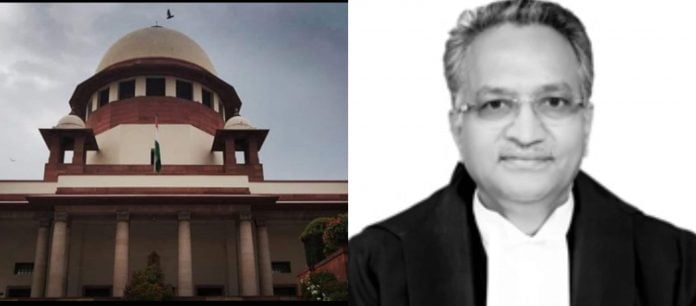New Delhi: Justice Ajay Manikrao Khanwilkar is set to become a member of the Supreme Court Collegium.
He will become part of the Supreme Court collegium after the retirement of Justice Arun Mishra today. He will be the fifth in seniority among the judges of the Supreme Court.
Justice Khanwilkar was appointed as Judge of the Supreme Court on May 13, 2016 and will remain in the Collegium till his retirement on July 29, 2022.
The Collegium will now comprise of the Chief Justice S.A. Bobde, Justice N.V. Ramana, Justice Rohinton Fali Nariman, Justice U.U. Lalit and Justice Khanwilkar.
The Collegium system was brought into existence by the Supreme Court through a judicial order in 1993, for recommending to the government the names of judges for appointment to high courts, the Supreme Court as well as for the transfer of judges.
Justice Khanwilkar litigated for 18 years before his appointment as an Additional Judge of the Bombay High Court in 2000. He had been the Chief Justice of the Himachal Pradesh High Court and the Madhya Pradesh High Court.
Some of the notable judgments are as follows:
Social Action Forum for Manav Adhikar V. Union of India (2018): A bench comprising then Chief Justice Dipak Misra, Justice A.M. Khanwilkar and Justice D.Y. Chandrachud modified the 2017 guidelines issued by a two-judge bench of the Supreme Court to curb the alleged misuse of section 498A of the Indian Penal Code. Section 498A pertains to subjecting a wife to cruelty.
Kaaviyaa Nakkiran V. State of Tamil Nadu (2017): A Supreme Court bench comprising then Chief Justice Dipak Misra, Justice A.M. Khanwilkar and Justice D.Y. Chandrachud ordered Tamil Nadu’s medical colleges to use the National Eligibility cum Entrance Test (NEET) as the only basis for admission. The State Government’s plea to accommodate students from rural backgrounds was denied.
Read Also: SC Issues direction to prevent Shivling from erosion: Mahakaleshwar Temple
Justice Khanwilkar was also the part of the Constitution bench during the tenure of the then Chief Justice Dipak Misra which had laid down some noticeable judgments. Justice A.M. Khanwilkar was part of the constitution bench which had read down Section 377 of the Indian Penal Code (IPC) to the extent it criminalised consensual sexual acts of adults in private. Justice Khanwilkar was also part of the bench which had allowed the entry of women of all age group into Kerala’s Sabarimala Temple.
– India Legal Bureau


